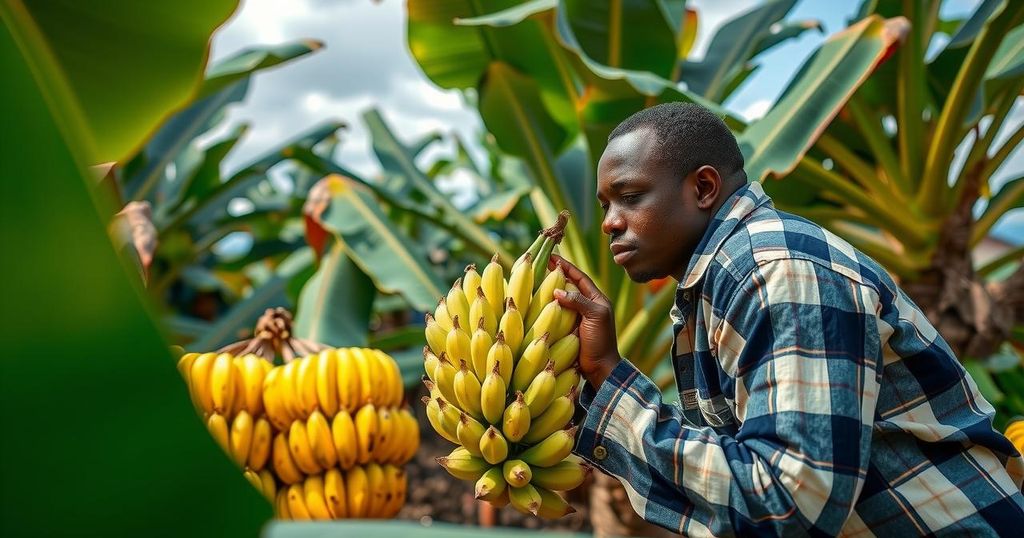Innovative Insurance Solutions: Empowering Uganda’s Banana Farmers Against Climate Risks
The article discusses how a novel insurance scheme is aiding banana farmers in Uganda, such as Ahumwire Justine, in coping with the impacts of climate change. Following severe weather events, farmers are now utilizing a digital platform to submit damage claims and receive timely insurance payouts, increasing their resilience against climatic fluctuations. Initiatives like the NDC Action Project are crucial for extending these benefits to a broader farmer community, thereby improving agricultural sustainability and financial stability.
In Uganda’s agricultural landscape, the impact of climate change poses significant challenges for banana farmers, particularly for individuals such as Ahumwire Justine, who suffered devastating losses during a storm that destroyed her banana trees and livestock. However, innovative solutions are emerging to assist farmers in mitigating these risks. The NDC Action Project, a collaboration involving the United Nations Environment Programme (UNEP) and the UNEP Copenhagen Climate Centre, aims to provide crucial support to smallholder farmers confronting the adverse effects of increasing climatic volatility. Bananas play a vital role in Uganda’s economy, with a substantial portion of the populace engaged in their cultivation. Yet, shifting weather patterns have resulted in unpredictable growing seasons, characterized by alternating periods of excessive rain and prolonged drought, jeopardizing farmers’ livelihoods. With assistance from initiatives like the Banana Industrial Research and Development Centre, farmers are being trained to utilize digital platforms for crop insurance claims, thereby expediting the claims process and enhancing their financial security. The insurance system is designed to connect farmers with insurers through a mobile platform, allowing for efficient assessment and compensation for crop damage. By involving farmers in training programs and encouraging the use of technology, the initiative is making strides toward expanding its reach to encompass a larger number of farmers nationwide. For Justine, the peace of mind associated with this insurance coverage signifies a transformative shift. “I know that if [my crops get damaged] I have help. It is not like in other years, where I would have to start from zero.” The project not only aims to improve resilience among farmers but also aspires to align with broader climate commitments, reinforcing the importance of agriculture in combatting climate change.
The article highlights the critical intersection of climate change and agricultural productivity in Uganda, focusing specifically on the banana farming sector. Banana cultivation is a major economic activity, engaging approximately 47 percent of farmers in the country. However, the intensification of extreme weather events, as noted by the Intergovernmental Panel on Climate Change, has left many farmers vulnerable, leading to a pressing need for supportive measures. Initiatives such as the NDC Action Project have emerged, with a dual focus on providing financial security through crop insurance and enhancing farmers’ resilience against climatic disruptions. Through education and technology, these initiatives aim to empower farmers, improve productivity, and facilitate access to financial resources.
In summary, the evolving landscape of Uganda’s banana farming sector underscores the urgent need for innovative solutions to combat the growing threat of climate change. The implementation of crop insurance through digital platforms represents a significant advancement in supporting farmers like Justine, who face considerable risk due to unpredictable weather patterns. Such initiatives not only offer immediate financial assistance but also contribute to long-term agricultural sustainability and resilience in the face of environmental challenges. By expanding these programs to a larger farmer base, Uganda is taking crucial steps towards safeguarding its agricultural economy and enhancing food security.
Original Source: www.unep.org




Post Comment